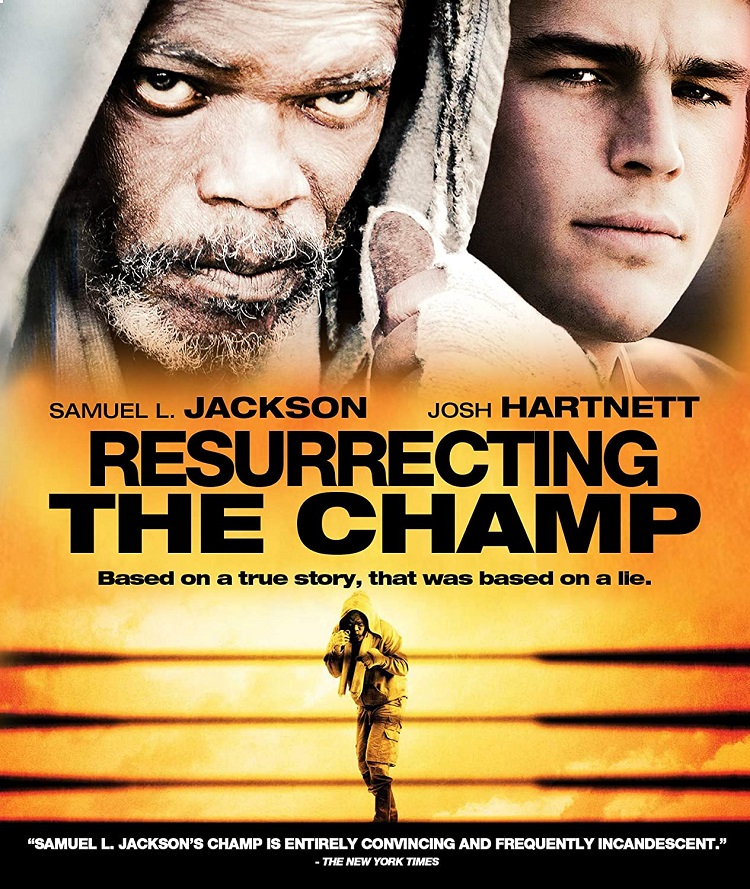
I love those evenings when you come home late, plop down in front of the TV, start clicking around, and stumble upon a movie you’ve never heard of. Sometimes, you find hidden treasure. Sometimes, you find immediate explanation as to the anonymity of the film. On one night, I not only found gold, but gold which led me down a path of irony.
Unfolding on my screen this night is the story of Erik Kernan Jr. (Josh Hartnett), a struggling Denver sports reporter living in the shadow of his deceased legendary sports broadcasting father. While striving to forge a career, Erik also seeks to build a relationship with his son, who he shares custody of with his ex-wife. One night after covering a boxing match, Erik stumbles upon an opportunity in the form of Battling Bob Satterfield (Samuel L. Jackson), a now homeless, former professional boxer. Sensing a potential story, our eager reporter begins not only an investigation, but a friendship with the poor pugilist. As the relationship between the two men grows, we learn of their individual battles as fighter and writer, and as father and son.
So intrigued by the story, I pick up my phone and begin to research. Resurrecting the Champ is based upon an L.A. Times Magazine article by J. R. Moehringer. Finding the article, I pause the film and dive in. I find myself deplopped from the couch and now walking about my home as I read the tale of two men who are no longer just characters in a movie. I suddenly reach a point in the article that causes me to stop and look around my home as if to see if someone is watching me. Our intrepid reporter did not meet the beleaguered boxer on the streets of Denver as depicted in the film. Our champ was found on the streets of Santa Ana, California, mere city blocks from where my own father grew up. That was one of many ironic elements I would find within this story, as I too had an absent father for much of my life. The irony has me standing alone in my home, not watching the movie, not reading the article, but reflecting on my relationship with my father, and ultimately, mentally resurrecting my champ. Standing there having the type of reaction one hopes to experience when being engulfed by well-written or well-spoken word. Pondering my own relationships, I finish the article, and replop into the movie.
With a screenplay by Michael Bortman and Allison Burnett, director Rod Lurie does a fine job of weaving intricate father-son relationships for us to examine. Unfortunately, with this tale including the burgeoning relationship between Erik and the Champ, along with their fathers and sons, and the other parental figures in the film, there simply may not be enough rounds in this fight for us to truly appreciate all the action in the ring. We’re left wanting more which is generally a good thing, but sometimes it’s because some of the storylines seem incomplete.
One of the other parental figures is Erik’s boss, portrayed with subtle brilliance by Alan Alda. It’s always challenging to not see Hawkeye in the work of Alda, but it’s a welcome addition here. All the performances in Resurrecting the Champ are solid with that of Jackson standing out as he becomes everything we would expect to find in a former boxer.
Recommendation: I jumped at the chance to get the Blu-ray when it hit store shelves on June 25 and so should you. There is bonus material on the new release, but it’s all quite brief. It would have been nice to see more about how the movie was made and what led to the choices the screenwriters made.
See the movie before you read the article as the movie takes quite a bit of creative license. Reading the article after seeing the movie allows you to clearly see Jackson as you enjoy every word.
This is more than a story about a reporter and a fighter. This is the story of the fight many of us face to accept who we are and who we think we should be in the eyes of our father and our sons. This is the story of the shortcuts we are willing to take. Though the shortcut makes the road rougher, it can lead us to become far more than we thought we could be.